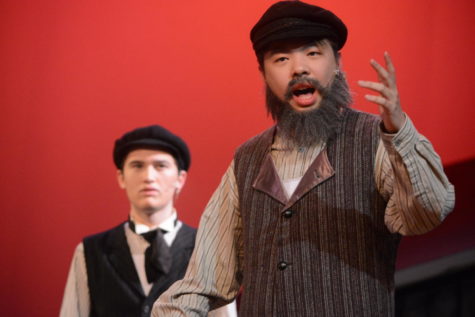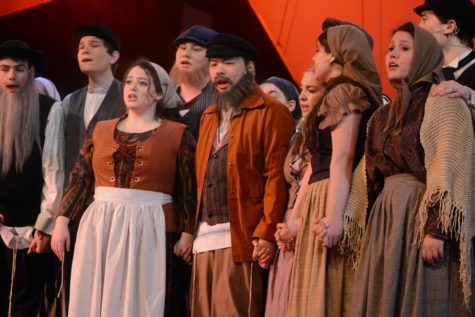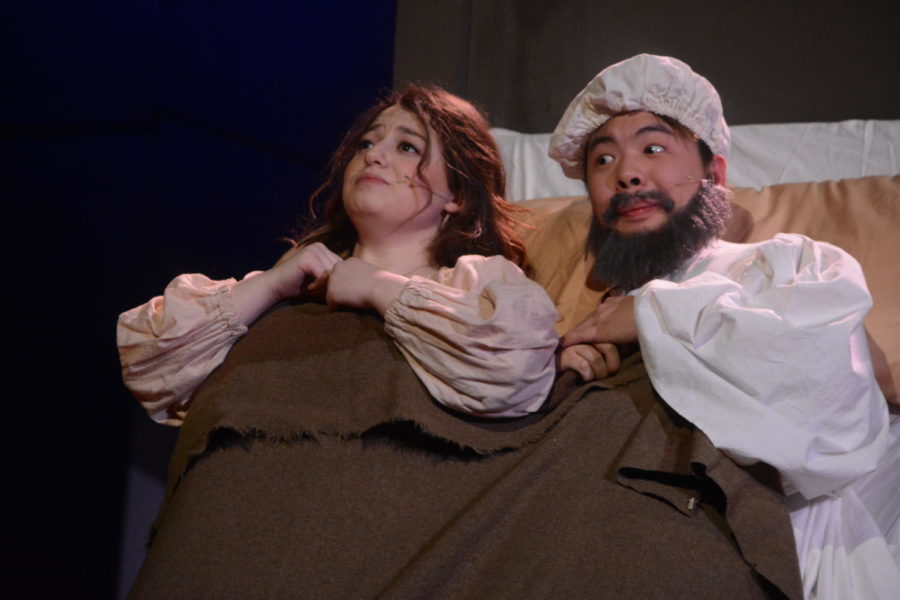The Fiddler on the Roof takes audience to turn of the century Russia
A change of heart– In a humorous scene from the Drama Department’s production of Fiddler on the Roof, Golde, played by senior Rebekah Moses (right), decides that her daughter should marry the town tailor, Motel, to the secret elation of Tevye (left), played by junior Tristan Wong. The cast performed on March 8, 9, and 10 after missing dress rehearsals due to snow.
April 5, 2018
“A fiddler on the roof… Sounds crazy, no? But here, in our little village of Anatevka, you might say every one of us is a fiddler on the roof. Trying to scratch out a pleasant, simple tune without breaking his neck.”
The Fiddler on the Roof begins with these lines from Tevye, played by junior Tristan Wong, the patriarch of a family in a Jewish village in czarist Russia. His opening musings foreshadow the precariousness of his family’s existence. Not only is Tevye’s family poor, but the very world with which he is familiar comes tumbling down over the course of the musical. This is particularly difficult for Tevye, a man of tradition, who proclaims his devotion to the ways of his forebears in the opening number of the musical. Indeed, Tevye’s struggle with the swift pace of change during the early 20th century underlies the events of the musical, which students performed at the high school auditorium from March 8th to the 10th.

Tevye has five daughters: Tzeitel, played by senior Elena Jimenez-McDermott; Hodel, played by junior Samantha Scheidel; Chava, played by junior Quinn Mahoney; Shprintze, played by senior Sarah Rahmig; and Bielke, played by senior Ally Dolmanisth. Tevye’s wife Golde, played by senior Rebekah Moses, expects to arrange marriages for her children with the aid of the town matchmaker, Yente, played by senior Megan Caccamo.
For the inhabitants of Anatevka, arranged marriages were the norm, with men consulting the father of their would-be brides. This was depicted in a humorous scene where Tevye confuses a request to marry Tzeitel from the wealthy butcher Lazar Wolf, played by junior Yash Sabarad, with a negotiation over the sale of a dairy cow. The two men eventually settle this mixup and Tevye gives his permission. However, Tzeitel is fixed upon Motel, the town tailor, played by senior Matt Thureson, and has no interest in Lazar Wolf. Tevye is thus forced to reconcile the tradition of an arranged husband and his daughter’s happiness. He eventually relents and allows Tzeitel’s marriage with Motel to proceed.

Over the course of the musical, Tevye contends with evermore extreme acts of rebellion from his daughters including Holde’s marriage to a passionate intellectual from Kiev and most provocative, Chava’s marriage to the gentile Russian soldier Fyedka, played by senior Aaron Robair.
“He is a very nice guy, very pleasant, very intelligent, but he’s not Jewish. He really wants to marry Chava, Tevye’s youngest daughter of the three older daughters that are able to marry . . . but being a Gentile, they’re not allowed because of cultural differences,” Robair said.
Although Robair plays a sympathetic character, the other czarist troops in Anatevka do not share his pleasantness. Their intimidating presence lurks throughout the musical, reminding the audience of this constant threat to Tevye’s way of life.
“In theater, we always talk about character motivation, and for Tevye, it’s the role of the actor to constantly decide whether Tevye’s motivations lean towards keeping tradition or maintaining familial harmony,” Wong said.
Wong sympathizes with Tevye’s struggles but does not agree with some of the character’s choices.
“His emotions often color his decision making and he has quite the temper, but he is also capable of making objective judgments and has many comical moments,” Wong said.
As part of his performance, Wong tried to embody Tevye’s physicality: lowering his center of gravity to imitate a heavy-set man.
“The beard also helped,” Wong said.
The actor noted that this musical differed from former productions, describing it as a “more somber show” and possessing a “melancholy tone”. Plona, who has performed in every school theatre production starting in seventh grade, agreed that Fiddler was a significant departure from the fantasy settings of previous years. In order to prepare for his role of Perchik, Plona studied other portrayals including Paul Michael Glaser’s performance in the 1971 film adaption of Fiddler.
“It was convenient because we started studying Marxism in AP Euro(Advanced Placement European History). So, that’s kind of something Perchik is into,” Plona said.
According to MentalFloss.com, Russian author Sholem Aleichem began writing short stories about Tevye the dairyman in 1894. These stories would inspire American playwright Joseph Stein, composer Jerry Bock, and lyricist Sheldon Harnick to create Fiddler which premiered on Broadway in 1964. The musical snagged nine Tony awards, experienced several revivals. And exceeded 3,000 Broadway performances.
The school production remained faithful to the original award-winning 1964 staging, save for “a few cuts in the dance music” meant to shorten its length. Senior Choreographer Caterina Wang choreographed the dancing featured in the musical. This is Wang’s first musical. She adapted dances from previous Broadway stagings of Fiddler to be accessible for student performers. Wang credits Jewish members of the cast for helping the other actors learn the dances.
“I was so excited because this musical definitely has more dancing than your typical musical,” Wang said.
The production involved students and staff members from a variety of departments. Drama and English teacher Katie Buckley directed the production with English teacher Vanessa Clarke as Assistant Director. This is Buckley’s seventh musical. Band teacher Thomas Johnston conducted the pit orchestra which consisted of around 15 high school teachers, teachers from nearby schools, and students from the high school. Johnston had to learn the entire score and script to ensure that the music stays on cue throughout the performance.
Art teacher Andrew Minor designed the set. After receiving the design, construction teacher Jeff Teravainen created a plan for set construction. Students enrolled in Construction I, under the direction of Teravainen, built the set. According to the Hartford Courant, art students then painted the set.
High school alumnus Ethan Sepa, a professional lighting designer, designed the lighting of the musical. The Audiovisual(AV) Department, under AV Director Evan Foreman, implemented Sepa’s lighting design. They were also charged with “mic reinforcement”, producing sound effects, and filming the production for submission into the Halo awards which recognizes Connecticut students involved in high school theatre. AV personnel for the production had to be willing to make “a very long commitment of time” to the musical. They included freshman Sound Designer Gabe Gantkin, senior Lighting Operator Arianna Canny, and senior Wireless Systems Manager Matias Semsettin who supervised the use of the microphones.
Rehearsals took place four to five times every week over the course of two months. Weekly choral rehearsals supervised by Vocal Music Director Leslie Imse and Choral Coach Louise Carrozza took place on Mondays. During these choral practice sessions, the music teachers trained cast members in harmonies as well as difficult rhythms and intervals. According to Imse, students familiar with performing in choirs worked to adjust to solo performance, including projecting their voice as well as maintaining expressivity and an even tone.
“We always embrace the musical and love to work with our colleagues in [the] Drama Department,” Imse said.
Buckley shared Imse’s enthusiasm for cooperation between departments.
“The drama, music, art, audiovisual and construction departments are comprised of such talented professionals—I work with the best!” Buckley said in the musical program.
180 people attended the first performance, the day after a major snowstorm. The following day saw 350 attendees. Exceeding those of the previous two days, the audience of the final day’s performance numbered 450.
According to Buckley and Clarke, the challenge of coordinating such a large cast for Fiddler was “worth it in the end”.
“The large ensemble lights up the stage,” Buckley and Clarke said.
The directors found it rewarding to see all the hard work pay off.
“It is a large time commitment for all involved, but it is incredible to see the students’ joy during the performances,” Buckley and Clarke said.
According to Moses, the entire cast developed close relationships with each other during the process of preparing for the show.
“We lost a lot of rehearsal time and pulling the show together, in the end, was a challenge, but we managed and everyone was very emotional the last night,” Moses said.
Wong expressed a similar sentiment, remarking on the combination of stress and pride.
“From the silent thumb ups backstage to the roaring applause of the audience, the theater experience has been unmatched by anything I’ve ever had. It really is magical and new every time you perform,” Wong said.


